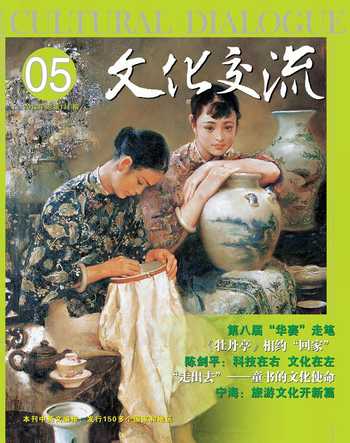永远的普希金
2012-04-29魏丹鸿
魏丹鸿



2012年2月10日是“俄罗斯现代文学之父”普希金逝世175周年的日子。当天,普希金的逝世地圣彼得堡举行一系列活动,纪念这位伟大的文学家。
民众纷纷来到教堂,为纪念普希金而祈祷,并在14时45分默哀,纪念他逝去的时刻。1837年2月8日,37岁的普希金在圣彼得堡与他人决斗时身负重伤,于2月10日14时45分在他的公寓中去世。公寓中书房的时钟也停留在这一时刻。普希金的后人特意从比利时赶到圣彼得堡,来到当年普希金决斗的现场,与人们一起朗诵普希金的诗歌。
位于圣彼得堡莫伊卡河岸12号的普希金公寓博物馆经过半年多的装修,也重新开馆,接待包括中国游客在内的来自世界各地的参观者。
在中国,对于稍年长的一代人来说,普希金是一段挥之不去的美好的文化记忆,是一笔无法割舍的精神财富。
普希金是俄罗斯著名的文学家、最伟大的诗人及现代俄国文学的创始人、19世纪俄国浪漫主义文学主要代表,同时也是现实主义文学的奠基人,现代标准俄语的创始人,被誉为“俄国文学之父”、“俄国诗歌的太阳”。他诸体皆擅,创立了俄罗斯民族文学和文学语言,在诗歌、小说、戏剧乃至童话等文学各个领域都给俄罗斯文学提供了典范。普希金还被高尔基誉为“一切开端的开端”。以普希金诗篇作脚本的歌剧《叶甫根尼·奥涅金》《鲍里斯·戈都诺夫》《黑桃皇后》《鲁斯兰与柳德米拉》《茨冈》等等,无一不是伟大的音乐作品;普希金的抒情诗被谱上曲,成了脍炙人口的艺术歌曲;有的作品还被改编成芭蕾舞,成为舞台上不朽的经典。
普希金创作了不少讴歌自由、憧憬未来的诗篇,他在《自由颂》中义无反顾地高唱:“我要为世人歌唱自由,我要惩罚皇位上的罪行。”他在《致大海》中借助歌颂自然景观的壮丽,抒发自己对美好未来的深情向往,“再见吧,大海!我不会忘记,你那美丽庄严的景象,我将久久地、久久地倾听,你在黄昏时分发出的轰响”。普希金的优秀作品达到了内容与形式的高度统一,他的抒情诗内容丰富、感情深挚、形式灵活、结构精巧、韵律优美。他的“用语言把人們的心灵燃亮”的崇高使命感和伟大抱负深深感动着一代又一代人。
每年的6月6日是俄罗斯的诗歌节,也被称作普希金节。这个节日是为了纪念普希金而设的,因为他诞生在1799年的6月6日。普希金广场上竖起的普希金纪念碑,是俄罗斯人为诗人而建的第一座纪念碑。1999年6月6日,是普希金诞辰200周年。整个俄罗斯沉浸在热烈的节日气氛中。在莫斯科,在圣彼得堡,在各城市乡镇的大街小巷,到处悬挂着画像、标语。那画像,是普希金;那标语,写的是这位诗人作品的片断。首都莫斯科的庆祝活动持续了3天。6月4日,莫斯科市在普希金纪念馆举行了“普希金诞辰200周年纪念会”开幕仪式和一个音乐会。6月5日,活动达到高潮。在普希金广场,纪念活动正式拉开帷幕。嘉宾们向普希金纪念碑献了鲜花。之后,散布在大街上的十多个露天舞台开始上演节目,所有演出,内容只有一个:普希金的作品。莫斯科市市长卢日科夫骄傲地说:“世界上还没有哪一个国家像俄罗斯这样庆祝一个诗人生日的。”
普希金与中国有着不解的情缘。我国有许多普希金研究者。此次,俄罗斯邀请了高莽和郑体武两位中国学者前往俄罗斯参加纪念活动。郑体武教授在俄罗斯科学院举行的研讨会上作了专题发言。他回顾了1900年,普希金的名字在上海出版的《俄国政治通考》上首次出现,以及1903年普希金的第一本中文译著《俄国情史》(又名《花心蝶梦录》,即《上尉的女儿》)在上海出版等历史,向俄罗斯同行讲述了上海与普希金的关系。他25分钟的演讲过程,数次被热烈的掌声打断。俄罗斯人为中国人民对这位诗人的推崇而鼓掌、而感动。
位于莫斯科西北800公里处的米哈伊洛芙斯基是普希金家族的世袭领地,由于诗人普希金曾在这里度过难忘的岁月并在这里写出许多不朽的诗篇,所以人们也习惯地把它叫做普希金小村。普希金的住房是由木板造成的,带有8个白色窗框的玻璃窗。庭院旁的小木屋的房门是敞开的,这敞开的门好像是在对参观者说:普希金正在林间小路上散步……在普希金住房的后面是两个大湖,索罗季河水正缓缓地淌过。
普希金的安寝地——圣山修道院建于1569年。今天它名满天下,世界各地的游人都前来拜谒,那是因为这里安寝着俄罗斯最伟大的诗人普希金。普希金的墓碑用白色大理石筑成,下面黑色大理石基座上用金字写道:亚历山大·谢尔盖耶维奇·普希金。普希金的墓碑上铺满了鲜花。“就像铭记自己的初恋一样,俄罗斯心中不会把你遗忘。”这两句出自俄国诗人丘特切夫纪念普希金的一首诗。
这位伟大的诗人对自己的人生有过评价,他说:“我给自己建立了非人手所能造的纪念碑。”普希金为自己建造的“纪念碑”,不仅是俄罗斯文学遗产的一部分,现代俄罗斯人在精神世界依然离不开它,而且它也是人类文化宝库中最璀璨的明珠之一。□
Pushkin: A Timeless Poet
By Wei Danhong
February 10, 2012 marked the 175th an-niversary of the death of Alexander Pushkin (1799-1837), the founder of modern Russian literature. On the day, a series of commemora-tion events were held in St. Petersburg. People attended memorials at churches and mourned him at 2: 45 in the afternoon. He died at this minute 175 years ago in his apartment in St. Petersburg after he was fatally wounded in a duel. His descendants came back from Belgium to read Pushkins poems at the spot where the poet fought his last duel. His apart-ment, now a museum, opened to the public after a 6-month refurbishment project. Some Chinese visited the museum on the day.
For some Chinese, Pushkin is a fascinat-ing memory as well as a spiritual wealth. He is considered by many as the greatest Rus-sian poet and the founder of modern Russian literature. He wrote poems, novels, plays, and stories for children. His writings served as models for modern Russian literature and standardized the language for literary creativ-ity. Maxim Gorky (1868-1936), a Russian and Soviet author who was influential in China for a long while in the mid 20th cen-tury, lauded Pushkin as the beginning of all the beginnings.
Russia is arguably the worlds most poet-ry-loving nation, though China outshines its northern neighbor in the number of poets and in the history of poem writing. Russia cel-ebrates poetry on June 6 in commemoration of Pushkin, for the poet was born that day. Previously it was known as Pushkin Poetry Festival. The day now is called Pushkin Day.
During the 200th anniversary of the birth of the great poet in 1999, Russia held a series of events and celebrations across the na-tion. Pushkin Square in Moscow is about 2 kilometers northwest of Kremlin. The statue of Pushkin at the square was Russias first-ever monument to a poet. His portraits could be seen everywhere in Moscow and St. Petersburg and other cities and towns across the nation. Moscow started the 3-day celebrations on June 4. At the Pushkin Museum, a launching ceremony for the 200th anniversary memorial was held and a concert was staged. The following day witnessed performances of Pushkins works on more than ten out-door stages at Pushkin Square.
Chinese scholars have long since taken interest in the great Rus-sian poet. In the 20th century, Chinese scholars translated the best of Russian literary works into Chinese. Zheng Tiwu, a professor of Russian literature with Shanghai International Studies University, and Gao Man, a prominent translator and honorary academician of Chinese Academy of Social Sciences, were invited to attend an academic exchange program in honor of the 200th anniversary of the birthday of Pushkin in 1999. Professor Zheng made a 25-minute presentation at a symposium held by Russia Academy of Sciences. He recalled how Pushkins name first appeared in a book published in Shanghai in 1900, how a Chinese translation of poets “The Cap-tains Daughter” first appeared in Shanghai in 1903. His presenta-tion was highly appreciated.□
